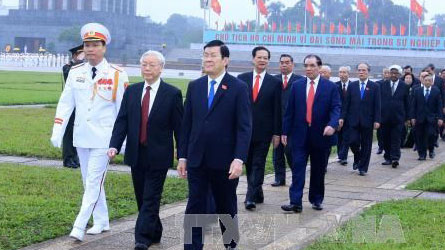
Top Vietnamese leaders paid tribute to late President Ho Chi Minh at his mausoleum in Hanoi on January 6 on the occasion of celebrating 70 years of Vietnam's first General Election Day.
Top Vietnamese leaders paid tribute to late President Ho Chi Minh at his mausoleum in Hanoi on January 6 on the occasion of celebrating 70 years of Vietnam’s first General Election Day.
Attended at the ceremony were Party General Secretary Nguyen Phu Trong, President Truong Tan Sang, National Assembly Chairman Nguyen Sinh Hung, Prime Minister Nguyen Tan Dung, and President of the Vietnam Fatherland Front Central Committee Nguyen Thien Nhan.
Former leaders of the Party, State, NA and government were also present at the event to show their respect and gratitude to late President Ho Chi Minh who made significant contributions to national building, liberation and independence.
The Tan Trao National People’s Congress was the precursor of the Vietnam National Assembly. Following the successful Congress, the Vietnamese people held a general election on January 6, 1946 to elect the country’s first National Assembly.
Over the past 70 years of establishment and development, the Vietnam National Assembly has become stronger as the highest State power body. Apart from exercising the constitutional and legislative powers, the NA makes decisions on national important issues and conducts the supreme oversight over the State’s activities.
Carrying both domestic and external affairs, the NA has fulfilled its missions in law-making, especially the creation of the Constitution 2013, which provides a firm foundation and long-term orientations for the country’s development.
Former leaders of the Party, State, NA and government were also present at the event to show their respect and gratitude to late President Ho Chi Minh who made significant contributions to national building, liberation and independence.
 |
Over the past 70 years of establishment and development, the Vietnam National Assembly has become stronger as the highest State power body. Apart from exercising the constitutional and legislative powers, the NA makes decisions on national important issues and conducts the supreme oversight over the State’s activities.
Carrying both domestic and external affairs, the NA has fulfilled its missions in law-making, especially the creation of the Constitution 2013, which provides a firm foundation and long-term orientations for the country’s development.





![[Photo series] Admiring the most beautiful riverside road in Dong Nai before its technical traffic opening](/file/e7837c02876411cd0187645a2551379f/012026/nen_20260114174655.jpg?width=500&height=-&type=resize)